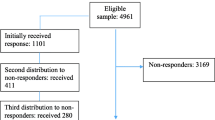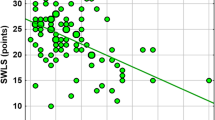Abstract
The poor health and psychological well-being of people in the former socialist states of Central-Eastern Europe are of serious concern and may be related to low perceived control. We compared depressive symptoms, life satisfaction, and self-rated health in 3,571 male and female university students from 5 Western European countries and 4,793 students from 5 Central-Eastern European countries. Depression scores (short Beck Depression Inventory; Beck & Beck, 1972) were higher in Central-Eastern than Western European samples. The prevalence of low life satisfaction was also greater in Central-Eastern Europeans, but ratings of self-rated health did not differ. Ratings of perceived control were diminished, but sense of mastery and internal health locus of control were higher in Central-Eastern Europe. Depression and low life satisfaction were associated with low perceived control and mastery and with strong beliefs in the influence of chance over health. However, taking these factors into account did not explain the East—West difference in depressive symptoms and low life satisfaction.
Similar content being viewed by others
References
Allgöwer, A. (2000). Gesundheitsförderung an der Universität: Zur gesundheitlichen Lage von Studierenden [Health promotion at universities: Students’ health situation]. Opladen, Germany: Leske & Budrich.
Barr, D. A., & Field, M. G. (1996). The current state of health care in the former Soviet Union: Implications for health care policy and reform. American Journal of Public Health, 86, 307–312.
Beck, A. T., & Beck, R. W. (1972). Screening depressed patients in family practice. Postgraduate Medicine, 52, 81–85.
Bobak, M., Pikhart, H., Hertzman, C., Rose, R., & Marmot, M. (1998). Socioeconomic factors, perceived control and self-reported health in Russia. A cross-sectional survey. Social Science and Medicine, 47, 269–279.
Bobak, M., Pikhart, H., Rose, R., Hertzman, C., & Marmot, M. (2000). Socioeconomic factors, material inequalities, and perceived control in self-rated health: Cross-sectional data from seven post-communist countries. Social Science and Medicine, 51, 1343–1350.
Bosma, H., Schrijvers, C., & Mackenbach, J. P. (1999). Socioeconomic inequalities in mortality and importance of perceived control: cohort study. British Medial Journal, 319, 1469–1470.
Carlson, P. (1998). Self-perceived health in East and West Europe: Another European health divide. Social Science and Medicine, 46, 1355–1366.
Carlson, P. (2001). Risk behaviours and self rated health in Russia 1998. Journal of Epidemiology and Community Health, 55, 806–817.
Cockerham, W. C. (1999). Health and social change in Russia and Eastern Europe. New York, Routledge.
Diener, E., Diener, M., & Diener, C. (1995). Factors predicting the subjective well-being of nations. Journal of Personality and Social Psychology, 69, 851–864.
Dolea, C., Nolte, E., & McKee, M. (2002). Changing life expectancy in Romania after the transition. Journal of Epidemiology and Community Health, 56, 444–449.
Fombonne, E. (1998). Increased rates of psychosocial disorders in youth. European Archives of Psychiatry and Clinical Neurosciences, 248, 14–21.
Furr, S. R., Westefeld, J. S., McConnell, G. N., & Jenkins, J. M. (2001). Suicide and depression among college students: A decade later. Professional Psychology: Research and Practice, 32, 97–100.
Goodman, E. (1999). The role of socioeconomic status gradients in explaining differences in US adolescents’ health. American Journal of Public Health, 89, 1522–1528.
Grob, A., Wearing, A. J., Little, T. D., & Wanner, B. (1996). Adolescents’ well-being and perceived control across 14 sociocultural contexts. Journal of Personality and Social Psychology, 71, 785–795.
Hillen, T., Schaub, R., Hiestermann, A., Kirschner, W., & Robra, B. P. (2000). Self rating of health is associated with stressful life events, social support and residency in East and West Berlin shortly after the fall of the wall. Journal of Epidemiology and Community Health, 54, 575–580.
Kopp, M. S., Skrabski, A., & Szedmak, S. (2000). Psychosocial risk factors, inequality and self-rated morbidity in a changing society. Social Science and Medicine, 51, 1351–1361.
Kristenson, M., Kucinskiene, Z., Bergdahl, B., Calkauskas, H., Urmonas, V., & Orth-Gomér, K. (1998). Increased psychosocial strain in Lithuanian versus Swedish men: The LiVicordia study. Psychosomatic Medicine, 60, 277–282.
Lachman, M. E., & Weaver, S. L. (1998). The sense of control as a moderator of social class differences in health and well-being. Journal of Personality and Social Psychology, 74, 763–773.
Leon, D. A., & Shkolnikov, V. M. (1998). Social stress and the Russian mortality crisis. Journal of the American Medical Association, 279, 790–791.
Lewis, G., Bebbington, P., Brugha, T., Farrell, M., Gill, B., Jenkins, R., et al. (1998). Socioeconomic status, standard of living, and neurotic disorder. Lancet, 352, 605–609.
Makinen, I. H. (2000). Eastern European transition and suicide mortality. Social Science and Medicine, 51, 1405–1420.
Manderbacka, K. (1998). Examining what self-rated health question is understood to mean by respondents. Scandinavian Journal of Social Medicine, 26, 145–153.
Marmot, M., & Bobak, M. (2000). International comparators and poverty and health in Europe. British Medial Journal, 321, 1124–1128.
McKee, M., & Shkolnikov, V. (2001). Understanding the toll of premature death among men in eastern Europe. British Medical Journal, 323, 1051–1055.
Monee Project. (1999). After the Fall: The human impact of ten years of transition. Florence, Italy: UNICEF.
Norman, P., & Bennett, P. (1996). Health locus of control. In M. Conner & P. Norman (Eds.), Predicting health behaviour (pp. 62–94). Philadelphia: Open University Press.
Palosuo, H. (2000). Health-related lifestyles and alienation in Moscow and Helsinki. Social Science and Medicine, 51, 1325–1341.
Rahkonen, O., Arber, S., & Lahelma, E. (1995). Health inequalities in early adulthood: A comparison of young men and women in Britain and Finland. Social Science and Medicine, 41, 163–171.
Skinner, E. A. (1996). A guide to constructs of control. Journal of Personality & Social Psychology, 71, 549–570.
Steptoe, A., & Wardle, J. (1996). The European Health and Behaviour Survey: The development of an international study in health psychology. Psychology and Health, 11, 49–73.
Steptoe, A., & Wardle, J. (2001a). Health behaviour, risk awareness and emotional well-being in students from Eastern Europe and Western Europe. Social Science and Medicine, 53, 1621–1630.
Steptoe, A., & Wardle, J. (2001b). Locus of control and health behaviour revisited: A multivariate analysis of young adults from 18 countries. British Journal of Psychology, 92, 659–672.
Steptoe, A., Wardle, J., Fuller, R., Davidsdottir, S., Davou, B., & Justo, J. (2002). Seatbelt use, attitudes, and changes in legislation: An international study. American Journal of Preventive Medicine, 23, 254–259.
Stone, R. (2000). Social science. Stress: The invisible hand in Eastern Europe’s death rates. Science, 288, 1732–1733.
Syme, S. L. (1989). Control and health: A personal perspective. In A. Steptoe & A. Appels (Eds.), Stress, personal control and health (pp. 3–18). Chichester, England: Wiley.
Wallston, K. A. (1992). Hocus-pocus, the focus isn’t strictly on the locus’Rotter social learning theory modified for health. Cognitive Therapy and Research, 16, 183–199.
Wallston, K. A., Wallston, B. S., & DeVellis, R. F. (1978). Development of the multidimensional health locus of control (MHLC) scale. Health Education Monographs, 6, 160–170.
World Bank. (2001). World development indicators. New York: Author.
Author information
Authors and Affiliations
Corresponding author
Rights and permissions
About this article
Cite this article
Wardle, J., Steptoe, A., Guliš, G. et al. Depression, perceived control, and life satisfaction in university students from Central-Eastern and Western Europe. Int. J. Behav. Med. 11, 27–36 (2004). https://doi.org/10.1207/s15327558ijbm1101_4
Issue Date:
DOI: https://doi.org/10.1207/s15327558ijbm1101_4




